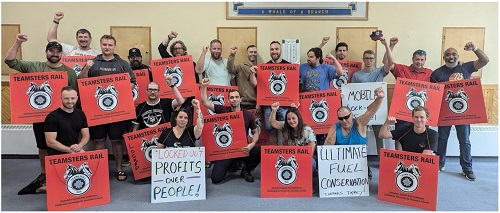Unprecedented Canadian rail strike: economic damage and inconveniences. “The government must intervene”
TORONTO – Today, the two largest Canadian railways stopped, thus confirming the strike called 72 hours earlier by the Teamsters Canada Rail Conference to demand better conditions for their members: over 9 thousand workers across the country. And the strike – still ongoing as we write – has already caused inconvenience and economic damage which risks assuming worrying proportions if the strike – which is unprecedented in Canadian history – does not stop.
The pressure is therefore growing for an intervention by the federal government which, until today, seems to have “slept” on the issue, given that the parties involved – the union and the railway companies – have been unable to reach an agreement.
“We are taking this very seriously. We don’t take it lightly, obviously, because Canadians across the country are concerned” Prime Minister Justin Trudeau said today. “This is something that impacts across the country, from workers, to businesses, to farmers, to consumers, who will be affected. That’s why we’re on this” Trudeau said, but did not specify how, concretely, “we’re on this”. In fact, large business groups continue to push for the federal government to intervene with facts, either through enacting labour code provisions referring the dispute to the Canada Industrial Relations Board for binding arbitration, or back-to-work legislation to avoid a long and damaging strike for the Canadian economy. The latter hypothesis is unlikely given that it would force the federal government to recall Parliament which is currently in summer vacation until mid-September and given that, in any case, the liberal minority would also have to secure the support, for that legislation, of another political party.
Result of this political immobility: since today, workers at Canadian National Railway (CN) and Canadian Pacific Kansas City (CPKC) are on strike, in what is the first simultaneous interruption of the two railway companies in the history of Canada. A (negative) record for Justin Trudeau’s government.
“Neither CN nor CPKC has relented on their push to weaken protections around rest periods and scheduling, increasing the risk of fatigue-related safety issues” Teamsters Canada’s statement reads. “CN also continues to demand a forced relocation scheme, which could see workers ordered to move across the country, tearing families apart in the process”.
According to the Railway Association of Canada, critical transportation lines affected by the closure carry more than $1 billion worth of cargo every day. Furthermore, more than 32,000 rail commuters in Montreal, Vancouver and Toronto are affected by the stop, where inconveniences were reported today in some areas of the GTA. Contract negotiations are underway in Montreal and Calgary, as picket lines increase. And Parliament is on holiday.
In the pic above, workers of the Halifax TCRC Division 247, today, in a post published on Twitter X by @TeamstersCanada



